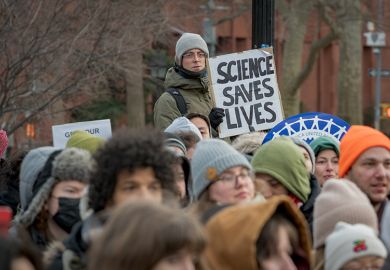Nobel Prizes awarded for discoveries around climate change and greener ways to create molecules underline the importance of supporting fundamental science in the battle to tackle environmental challenges, experts said.
Ahead of the COP26 climate summit in Glasgow, there are growing concerns that some governments will backtrack on science funding commitments – such as the UK’s pledge to spend £22 billion a year on research by 2024-25 – and instead scale up short-term steps to cut carbon emissions, such as increasing the use of electric cars, renewable electricity and low-carbon heating.
Nor are UK ministers alone in telling research funders to prioritise areas that enable “impact, research commercialisation and collaboration with business”, signalling that fundamental research may not be prioritised for additional funding.
But last week’s physics prize – which was awarded to Syukuro Manabe and Klaus Hasselmann for building reliable climate change models – demonstrated the continued importance of supporting blue sky science when seeking to combat global warming, said Joanna Haigh, emeritus professor of atmospheric pressure at Imperial College London, who, until 2019, was co-director of Imperial’s Grantham Institute – Climate Change and the Environment.
THE Campus resource: Demystifying impact – a glossary of key terms
“Investing in engineering and wind turbines is important but if we do not understand what is going on in the environment, how can we address these issues?” said Professor Haigh, a former president of the Royal Meteorological Society.
Applying high-level physics research to the study of global warming – as Professor Manabe and Professor Hasselmann have done – would be even more crucial in future as the world hits certain “tipping points”, such as the melting of polar ice caps, that lead to large and often irreversible changes in climate, explained Professor Haigh. “We have a lot more to understand, so dropping back on this agenda would be a huge mistake for the UK,” she argued.
The decision to award the Nobel Prize to atmospheric physics was also long overdue, said Professor Haigh. “It is sometimes seen as the poor relation in the physics community as it is not particle or high-energy physics or astrophysics,” she said.
The research honoured by this year’s chemistry prize, which was awarded jointly to Scotland’s David MacMillan, now based at Princeton University, and Benjamin List, from the Max Planck Institute for Coal Research in Mülheim, has been hailed as revolutionary in creating greener ways to produce molecules using enzymes and organic catalysis rather than metal-based reactions.
“It’s a process which is very attractive for pharmaceutical companies because any trace of metal, even down to the billionth level, is unacceptable in medicine – catalysis means there is no risk of impurities,” explained Stephen Clark, professor of organic chemistry at the University of Glasgow, where Professor MacMillan took his undergraduate degree.
It was “just a bit of a coincidence” that the Nobel recognition for a tool that has cut pollution in drug and chemical manufacturing came ahead of the Glasgow climate summit, said Professor Clark, but it highlighted how basic science breakthroughs could contribute to the environmental agenda.
“It is no secret that we need to improve and we are constantly striving to make things more efficient and environmentally friendly – all of organic chemistry is looking how we can do things differently, which can also lead to huge commercial pay-offs,” he said.
POSTSCRIPT:
Print headline: Nobel wins show blue sky research key to tackling climate challenges
Register to continue
Why register?
- Registration is free and only takes a moment
- Once registered, you can read 3 articles a month
- Sign up for our newsletter
Subscribe
Or subscribe for unlimited access to:
- Unlimited access to news, views, insights & reviews
- Digital editions
- Digital access to THE’s university and college rankings analysis
Already registered or a current subscriber? Login









